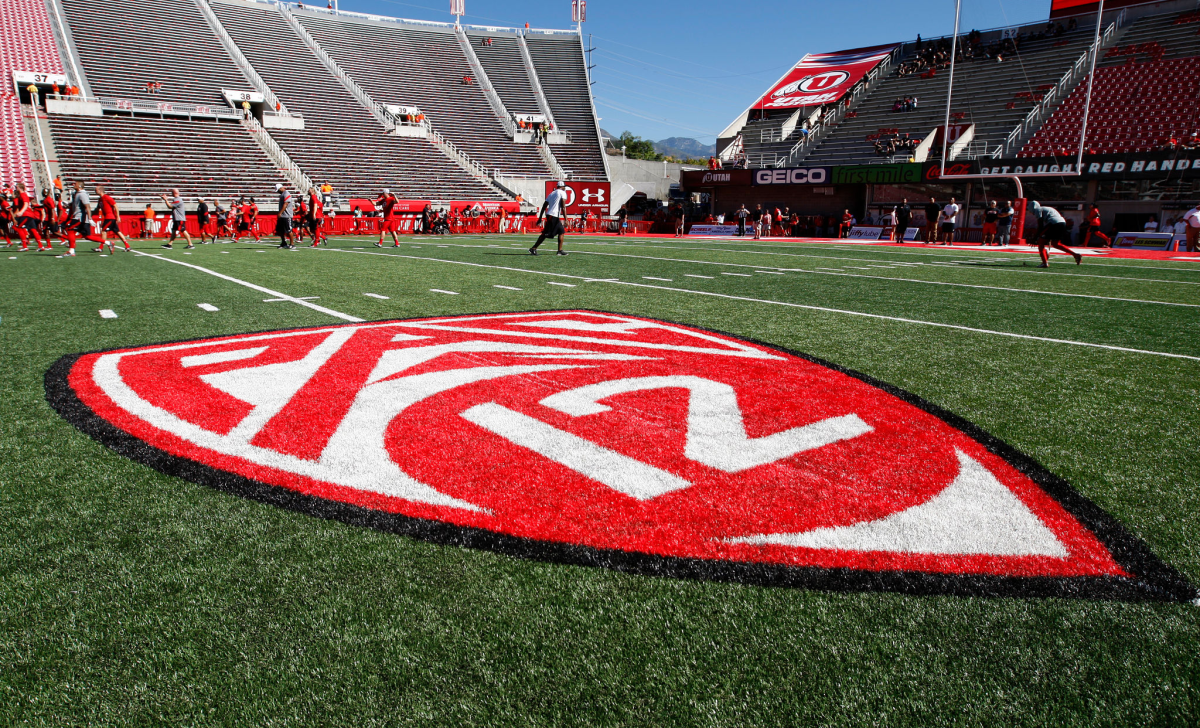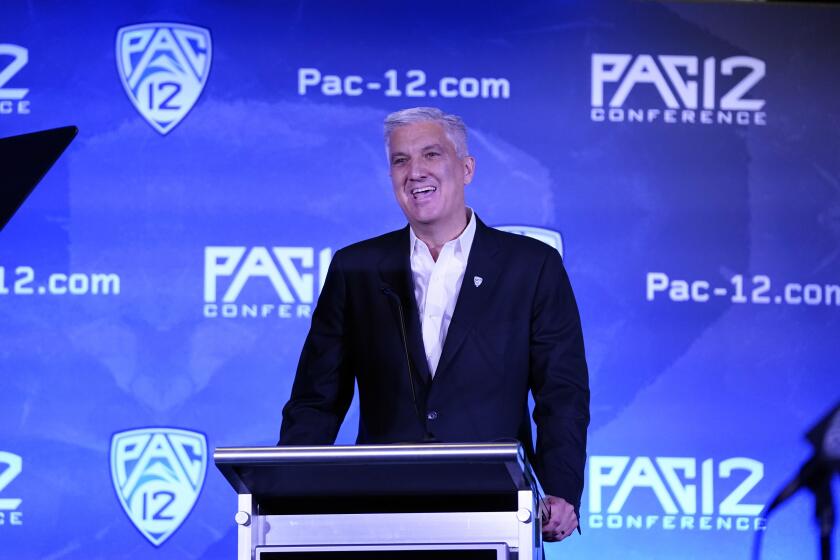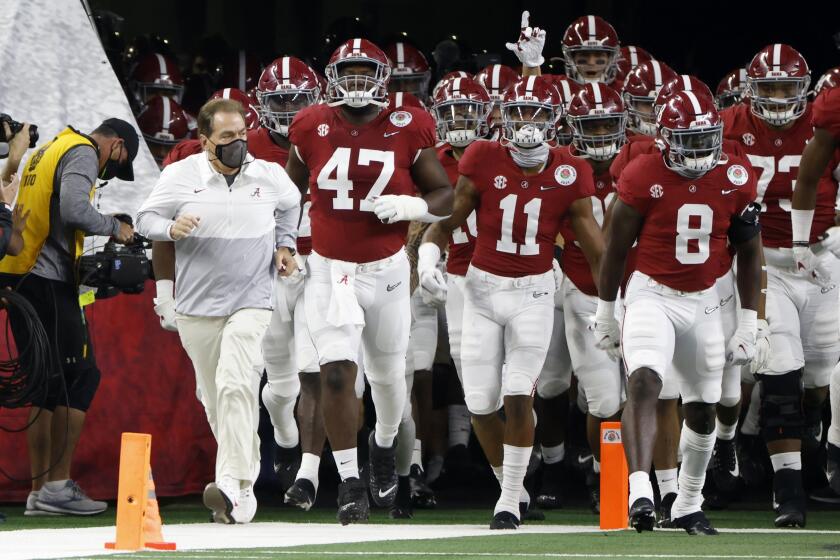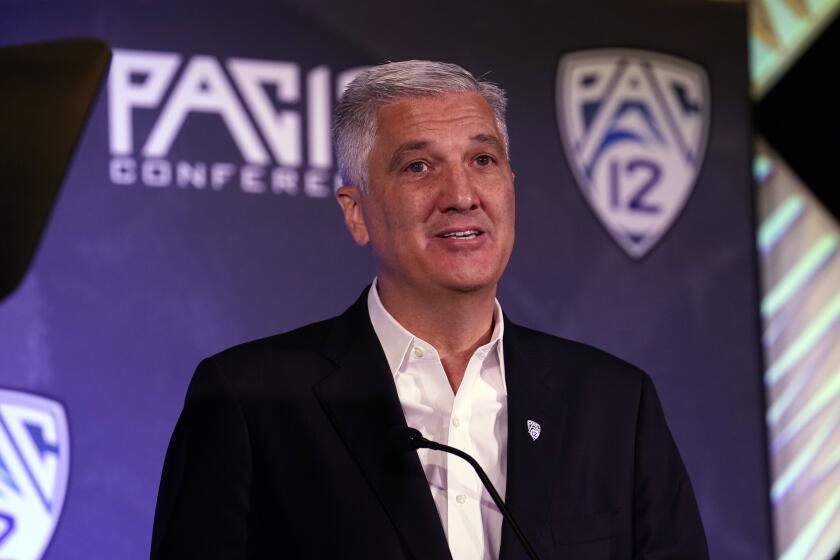Commentary: Pac-12, Big Ten and ACC feeling morally superior to SEC, but will pact bring change?

- Share via
They said it wasn’t about the money. Over and over again, three of the most powerful men in college athletics emphasized they were just trying to do the right thing, with Big Ten commissioner Kevin Warren even adding a “for once” in a Freudian slip.
“Today is a special day,” Warren said. “What it signifies is there’s still a lot of goodness in college athletics.”
Tuesday, the Pac-12, Big Ten and Atlantic Coast conferences, three of the “Power Five,” made official their “alliance” to collaborate in mapping a future for college sports that suits them — not the Southeastern Conference, which spurred this meeting of the minds by poaching Texas and Oklahoma from the Big 12 last month.
What the announcement of this alliance really signified is that the 41 university presidents and chancellors represented by their commissioners in a surreal press conference couldn’t pass up the opportunity to happily pat themselves on the back as their mouthpieces spouted high-minded rhetoric meant to differentiate between us, those who care about the welfare of the “student-athlete,” and them, the evil, Machiavellian SEC.
Pac-12 commissioner George Kliavkoff said SEC expansion strengthens the Pac-12’s standing and potential new members would have to clear a high bar to join.
“Hopefully this will bring some much-needed stability in college athletics,” Warren said, “and I also think what it will do is allow people to understand where everyone else stands, because the events of the last couple months have kind of shaken the foundation of the beliefs of college athletics.”
The Big Ten, more than any athletic conference aside from the Ivy League, loves to feel morally superior to its peers. The “everyone else” Warren referenced is the SEC, which is apparently now lacking in “goodness” because it exercised its ability to add two extremely desirable members to its fold in the Longhorns and Sooners.
Goodness gracious with the sanctimony.
Warren would have you believe the SEC announced it is cutting all non-revenue sports, going professional in football and men’s basketball and mandating athletes devote 80 hours per week to their sport and 10 to academics.
What the SEC did is strengthen its death grip over the enterprise’s most important product, presumably with the full support of ESPN, its eager TV partner that also would stand to benefit the most from a 12-team College Football Playoff being rammed into early existence. These are moves that made total sense for the SEC, which exists — and this shouldn’t need a news bulletin — to make its schools as much money as possible.
With the SEC poised to add Texas and Oklahoma, four Los Angeles Times writers gathered to draft four, 16-team super conferences. The selections and snubs may surprise you.
It always has been a two-horse race to the top of college sports’ pyramid of power, and once the SEC made its move, the Big Ten always was going to have to counter. Sure, the Big 12 leftovers were begging for a spot in the Pac-12, and the ACC could have moved to save West Virginia, but Warren and his self-righteous band of Midwestern presidents were the ones who had the cards to make a real play.
The Big Ten, for instance, could have come calling for USC and a collection of its Pac-12 brethren, gaining brands that fit in athletic tradition and academic pretentiousness and would add a presence in major television markets.
It simply was unwilling to do so — likely because its chief executive group couldn’t resist using this as a chance to remind everyone how much better their schools are than whatever they’ve convinced themselves the SEC has become.
The Pac-12, led by intrepid new commissioner George Kliavkoff, gained the most from the Big Ten’s lack of territorial ambition. Kliavkoff’s best move from the moment Texas and Oklahoma left the Big 12 was not pillaging that league’s leftovers but forming an alliance of some kind with the Big Ten, a strategy built on offensive and defensive principles. He said Tuesday the Pac-12 will announce whether it will expand membership by week’s end — based on everything said Tuesday, expect that answer to be a “no” or at minimum a “not right now.”
The Pac-12 made a surprise move by naming MGM president of entertainment and sports George Kliavkoff its new commissioner. Here’s who they selected.
What a month it’s been for the Pac-12. Imagine if someone told you the Pac-12 was going to be arguably the third-most powerful conference in college sports and that it was going to have a place at the table to bargain for its future alongside the Big Ten and ACC. The Pac-12 now can focus on getting to the point where it can win more of these “epic” games with the Big Ten and ACC we’re supposedly going to see in the coming years.
The alliance was light on scheduling details. Of course, that’s the one thing the average college sports fan cares about — who is my team going to play and when? Those answers won’t come possibly for years — especially in football, where matchups are scheduled years in advance.
Tuesday was a grand posturing, and the messaging was consistent if nothing else. These three leagues now publicly have promised to collaborate on: athlete mental and physical health, safety, wellness and support; academic experience; diversity, equity and inclusion; social justice; gender equity; the future structure of the NCAA as it prepares for a “constitutional convention” in November; federal legislative efforts; and the CFP.
To a group of schools that for years has been crucial to the NCAA’s governance — and failings in these areas — good luck with that.
The worry with this shared creation of the big, bad SEC villain is that these schools will stage an unnecessary overcorrection at a time when the writing is on the wall about how the Supreme Court and state and federal legislators feel about the “collegiate model.” Does it seem like something that needs protecting at this point? Doubling down as these conferences did on paternalistic, old ideals may not be the proper response to today’s “turmoil.”
With a history of innovation and elite problem-solving skills, commissioner George Kliavkoff says it will be fun helping the Pac-12 navigate massive changes.
Athletes in football and men’s basketball getting a fair cut of the revenue pie can be good. The NCAA having less of a role in governance can be good. Colleges acknowledging that they are trying to make lots of money off athletics can be good. A more inclusive College Football Playoff can be good. Even embracing the professional nature of what football and men’s basketball have evolved into can be good.
That was not the message from Kliavkoff, Warren and Phillips, but luckily, they’ve got time to figure out exactly where they stand too. Maybe they’ll actually do it together, as they’ve stated.
There is a way to have an honest reckoning about what college sports should be in 2021 without saying good-bye to the qualities that have made them so special to so many. Tuesday confirmed we can’t expect the presidents of prestigious American universities to lead that nuanced discussion.
More to Read
Go beyond the scoreboard
Get the latest on L.A.'s teams in the daily Sports Report newsletter.
You may occasionally receive promotional content from the Los Angeles Times.














